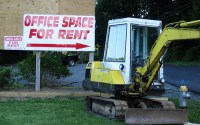December 31, 2013
Part I – Landlord Self Help in Virginia
Suppose a company leases commercial property to run its business. Due to economic conditions, the tenant struggles to pay rent. The landlord has declared the tenant in default, or is threatening to do so. One of the remedies asserted by the landlord is “self-help” such as changing the locks and removing the business’ property from the premises. Can the landlord do that? What strategies and considerations are available to the tenant in such a situation?
When a tenant of a commercial property falls into default under the lease, or such default is imminent, knowing what options the landlord has moving forward is essential. The tenant making present use of the leased premises needs to know the landlord’s potential legal remedies so it can craft its own plan for the immediate future and to provide a framework for negotiations. In Virginia, and other jurisdictions where landlord self-help is permitted, threats such as changing the locks or otherwise barring the tenant from re-entry, removal of the property from the premises and placing it elsewhere may be the most urgent concern to a struggling commercial tenant. Understanding the respective rights of the landlord and tenant are crucial to planning continuity of business operations and safeguarding company property.
In Virginia, a landlord in a residential lease has no right of self-help eviction. However, the right of self-help remains an option for non-residential leaseholds. The commercial landlord is limited to using reasonable force in taking possession of the property upon default. The landlord may not “Breach the Peace” in taking possession. In other words, confrontation threatening physical harm is not permitted. Self-help may be attractive to the landlord in order to make an urgent transition to a new tenant without having to go to Court, take the case to trial and have the sheriff come out to the property.
While the remedy of self-help is legal in Virginia in non-residential matters, there are several considerations that make landlords reluctant to pursue it. In Part II, I will discuss several reasons why landlords usually avoid trying self-help eviction.


